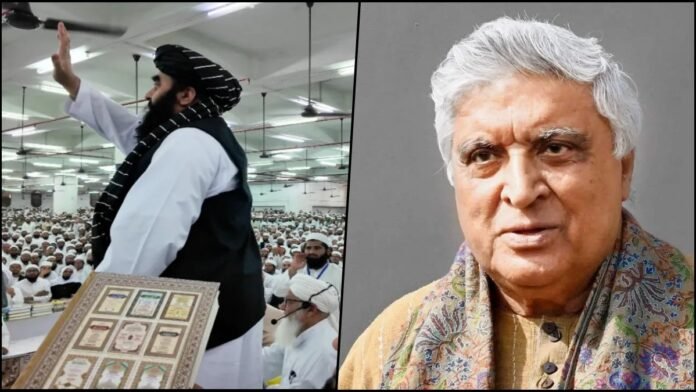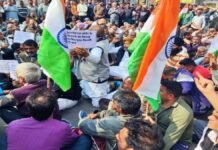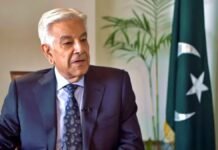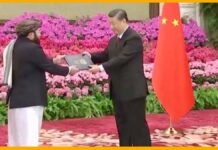
Key Points:
- Renowned lyricist Javed Akhtar strongly condemned the reception given to Taliban Foreign Minister Amir Khan Muttaqi during his six-day visit (October 9-16, 2025)
- Muttaqi received a grand welcome at Darul Uloom Deoband in Saharanpur on Saturday, October 12, marking the first high-level Taliban visit to India since 2021
- Akhtar criticized those who “beat the pulpit against all kinds of terrorists” for honoring the representative of “world’s worst terrorist group”
- The veteran writer specifically condemned Deoband for welcoming a leader who has completely banned girls’ education in Afghanistan
- The visit sparked controversy after female journalists were initially excluded from a press conference at the Afghan embassy, though they were later invited following outrage
- Muttaqi’s scheduled visit to the Taj Mahal in Agra was cancelled on Sunday without any official reason
New Delhi: Bollywood screenwriter and lyricist Javed Akhtar expressed his deep disappointment and shame over the reception accorded to Afghanistan’s Taliban Foreign Minister Amir Khan Muttaqi during his historic visit to India. Taking to social media platform X (formerly Twitter) on Monday, October 13, Akhtar wrote, “I hang my head in shame when I see the kind of respect and reception that has been given to the representative of the world’s worst terrorist group Taliban, by those who beat the pulpit against all kinds of terrorists”.
The celebrated lyricist directly targeted Darul Uloom Deoband for giving such a reverent welcome to their “Islamic Hero,” who is among those responsible for completely banning girls’ education in Afghanistan. He concluded his scathing tweet with a poignant question to fellow Indians: “My Indian brothers n sisters !!! what is happening to us?”.
Muttaqi’s Controversial Six-Day India Visit
Amir Khan Muttaqi arrived in New Delhi on Thursday, October 9, for a six-day visit marking the first high-level delegation from Kabul to India since the Taliban seized power in Afghanistan in August 2021. On Friday, October 10, External Affairs Minister Dr. S. Jaishankar held detailed discussions with Muttaqi, discussing bilateral relations, regional developments, and security concerns.
The visit assumes greater significance as it comes at a time when both India and Afghanistan are having strained relations with Pakistan over cross-border terrorism and regional security issues. During the official talks, both sides unequivocally condemned all acts of terrorism emanating from regional countries, and the Afghan Foreign Minister reiterated that Afghanistan will not allow any group or individual to use its territory against India.
Grand Reception at Darul Uloom Deoband
On Saturday, October 12, Muttaqi visited the prestigious Islamic seminary Darul Uloom Deoband in Saharanpur district, Uttar Pradesh, where he was welcomed by thousands of people. The anticipated public address by the Taliban minister was cancelled amid a massive frenzy as crowds surged to catch a glimpse of him. Instead, Muttaqi, distinctive in his black turban, addressed a select gathering within the library of the seminary.
During his visit to Deoband, Muttaqi expressed optimism about future India-Afghanistan relations, stating, “I have hopes for stronger ties in the future from the way I was received in Delhi. These visits may be frequent in the near future”. Maulana Arshad Madani, principal of Darul Uloom, highlighted the enduring friendship and emphasized the institution’s role in regional stability.
Historical Connection Between Taliban and Deoband
The Darul Uloom Deoband, established in 1866 in Uttar Pradesh, is one of South Asia’s most influential Islamic seminaries and a historic seat of Islamic scholarship. The Taliban’s ideological connection to Deobandi Islam is deeply rooted in the movement’s history, as many Taliban leaders were educated in Pakistani madrasas like Darul Uloom Haqqania, which was established along the lines of Deoband.
The seminary in Pakistan counts among its alumni several prominent Taliban figures, including Sirajuddin Haqqani and former leader Akhtar Mansour. Both Deobandi institutions and the Taliban emphasize implementing Islamic law in its entirety and oppose Western cultural influences.
Taliban’s Regressive Policies on Women’s Rights
Javed Akhtar’s primary concern centers on the Taliban government’s fundamentalist policies that have severely restricted women’s rights in Afghanistan. The complete ban on girls’ higher education remains one of the most criticized policies, drawing condemnation from human rights activists and intellectuals worldwide. These regressive measures stand in stark contrast to democratic values and human rights principles, making the grand welcome extended to a Taliban representative particularly controversial.
Controversy Over Female Journalists’ Exclusion
The Taliban minister’s visit sparked additional controversy when female journalists were not allowed to attend the press conference at the Afghan embassy on Friday. The exclusion led to significant backlash from opposition parties and media organizations. However, following the outrage, female reporters were later invited to meet with Muttaqi. The Centre clarified that it had “no role” or involvement in the press interaction arrangements at the Afghan embassy.
Cancelled Taj Mahal Visit
Afghanistan’s Foreign Minister was scheduled to visit the Taj Mahal in Agra on Sunday, October 13, but the visit was cancelled at the last moment without any official explanation. Muttaqi was expected to leave Delhi around 8 am via the Yamuna Expressway and spend about an hour and a half at the iconic monument before returning to Delhi. Agra district authorities had prepared elaborate security measures for the high-profile visit, but Deputy Commissioner of Police Sonam Kumar confirmed receiving a directive from Delhi to cancel the visit.
Political and Diplomatic Implications
While Akhtar remains one of the few Bollywood celebrities to openly share his political viewpoint on this sensitive issue, no other film industry personality has publicly commented on Muttaqi’s visit. The visit has drawn mixed reactions, with some opposition leaders like PDP chief Mehbooba Mufti questioning the foundation of building international relations when trust, respect, and equality are lacking within the country’s own Muslim population.
India has not yet formally recognized the Taliban administration in Afghanistan, though the country’s “technical mission” in Kabul is reportedly set for embassy status. The visit comes as Russia and China deepen their engagement with the Taliban, including strategic investments and formal recognition, prompting India to consider renewing economic and humanitarian commitments in Afghanistan.
Javed Akhtar’s powerful statement has ignited a crucial national debate about whether it is appropriate to honor representatives of groups that oppose democratic values and human rights, especially for political or religious considerations.




















































